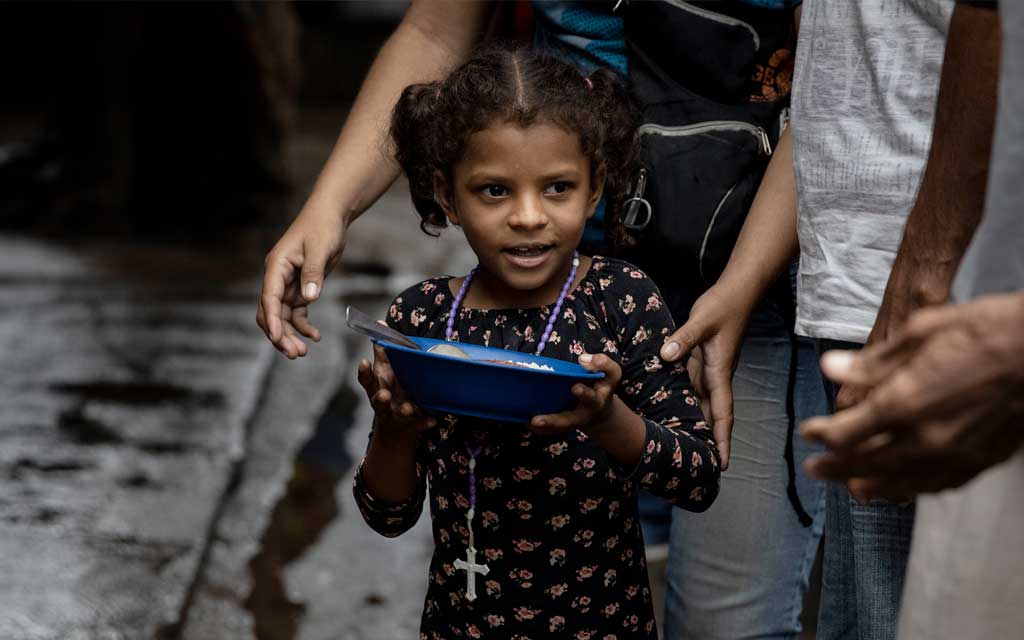Venezuela Crisis
Karen was forced to leave everything behind and start over far from home.
With the collapse of the healthcare system in Venezuela, Karen was unable to get the care her son needed for a debilitating medical condition, forcing her to make the difficult decision to flee her home and seek shelter in Colombia.
Photo: ©UNHCR/Vincent Tremeau
Families like Karen’s have suffered years of hardship. Now they are far from home, struggling to survive.
Please help provide the aid they urgently need.

Shelter
to protect those who’ve fled with nothing

Nutrition
to keep hungry families alive and well

Clean water
to prevent the spread of deadly diseases
What’s happening in Venezuela?
Venezuela is in the middle of a political, economic and humanitarian crisis. More than 7.1 million people have left the country amidst violence and crippling food shortages—making it the biggest exodus in South America’s recent history.
The situation evolving in Venezuela, a country that has traditionally been a generous host to thousands of refugees, has led to large outflows of its citizens and other residents into the region and beyond.
Majority of Venezuelans are living in countries within Latin America and the Caribbean. However, many remain without any documentation or permission to stay regularly in nearby countries, and therefore lack guaranteed access to basic rights. This makes them particularly vulnerable to labour and sexual exploitation, trafficking, violence, discrimination and xenophobia.
Why are food and medicine scarce in Venezuela?
Political turmoil has caused the Venezuelan economy to implode in recent years—leading to chronic shortages of basic supplies. In parts of this oil-rich country, fuel has become scarce and drivers queue for days at petrol stations. Meanwhile across the country, blackouts are frequent, medicine is in short supply and millions of families go hungry. Hyperinflation puts what little basic supplies are available out of reach of most ordinary families.
Where are Venezuelan families fleeing to?
Families are travelling across Latin America and the Caribbean—especially to Colombia, but also to Argentina, Brazil, Chile, Costa Rica, Ecuador, Mexico, Peru and beyond. These host countries have been welcoming, but they are increasingly overstretched and some are reaching a saturation point.
What dangers do they face en route?
Fleeing families often take irregular routes to find safety, crossing fast-flowing rivers or braving treacherous footpaths to reach their destinations. Many fall prey to smugglers, traffickers and armed groups on the way, and unaccompanied or separated children are particularly vulnerable.
Where can I access the latest data and reports?
Venezuela Operation—UNHCR’s relief work to protect Venezuelans.
Venezuela Situation Portal—for latest updates on the crisis overall, including UNHCR situation reports, funding requirements and UNHCR’s support for neighbouring countries taking in Venezuelan refugees.
Where is UNHCR working?
In close collaboration with host governments, partner organizations, civil society, faith-based organizations, and UN Agencies (particularly IOM), UNHCR is undertaking several activities to protect Venezuelan refugees and migrants while responding to their humanitarian needs and promoting socio-economic inclusion.
To ensure safe and dignified reception conditions, UNHCR has stepped up its presence in border areas across the region, providing life-saving assistance (including drinking water and hygiene kits for women and children) and responding to the basic needs of refugees and migrants while ensuring access to territory and asylum, providing legal aid and counselling and upholding refugee law and practice.
To promote the integration of refugees and migrants in their host communities, UNHCR works closely with local authorities, civil society and the private sector and supports providing vocational training to Venezuelans. UNHCR is also supporting the relocation of Venezuelan refugees and migrants to places with more employment opportunities and services.
UNHCR works with governments across the region to strengthen registration and national asylum systems and advocates for the socio-economic inclusion and local integration of refugees and migrants.Together with civil society and governmental partners, UNHCR supports temporary shelters and accommodation networks, community infrastructure interventions, child-friendly spaces, and spaces for breastfeeding mothers at border crossing points.
A comprehensive cash transfer programme helps refugees and migrants to meet their most urgent needs, such as food, rent and utilities. By receiving this support, Venezuelans contribute to the economies of hosting communities by purchasing services and goods locally.Anti-xenophobia campaigns have been implemented by UNHCR and partners in different countries to curb discrimination and promote peaceful coexistence between Venezuelans and host communities.
UNHCR has established networks of volunteers to improve our links with the communities and ensure two-way communication and accountability while working with different population groups, including women, children, elderly people, young people, and persons with disabilities, as well as indigenous and LGBTIQ+ groups. In addition, UNHCR is coordinating with partners a regional Support Spaces initiative to ensure that refugees and migrants receive updated and reliable information and a minimum package of services in key locations across the region.
Did you know that there has been an 8,000 per cent increase in the number of Venezuelans seeking refugee status worldwide since 2014?

Valentina has known hunger and hardship for much of her young life.
When her family left Venezuela in search of a better life, they headed to Colombia—never knowing what they might find there.
Thankfully, they reached a communal kitchen supported by UNHCR, where 5,000 free meals are served each day to help families like Valentina’s stay alive and well.
Photo: ©UNHCR/Siegfried Modola
Donate Today
Please help Venezuelan refugee families in need.
Donate Today
Please help Venezuelan refugee families in need.


